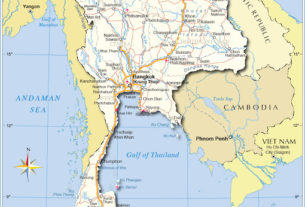Airport Railway Link’s new route, or phase 2, is under construction even though its date of completion has yet to be finalized. The new route is expected to help promote Thailand as an aviation hub in the Southeast Asian Region.
On August 23, 2010, Thailand’s long-awaited project has finally opened its door to the public. Suvarnabhumi Airport Link has officially commenced its long-overdue regular services between the Airport and downtown Bangkok. The line, owned and operated by State Railway of Thailand (SRT), has been built by a consortium of B Grimm, STECON, and Siemens at the cost of 25.9 billion baht.
The Airport Link’s City Line runs every 15 minutes, and the Express Line every 30 minutes. Both lines operate from 6am to midnight daily. The trains have a maximum speed of 160 kilometres per hour. Airport Link connects Bangkok and Suvarnabhumi International Airport via two different lines: City Line and Airport Express Line. City Line stops at every station between Phayathai Station and Airport Station, whereas Express Line offers a non-stop service from Makkasan Station to the airport and vice versa. Makkasan Station is also called a City Air Terminal, as airline check-in counters will be set up there.
The Airport Link can serve up to 50,000 passengers a day, generating revenue of one million baht daily. It is also believed that the Airport Railway Link will help lower pollution in the city and make life easier for the public.
The second phase, part of the SRT’s Dark Red line, which starts from Phaya Thai North to Don Mueng airport via Bang Sue, is now under construction. The construction has been supported by the Japanese government, which has granted a 24-billion-baht loan to Thailand for the project.
Japan has granted the loan to Thailand on account of the latter’s being a member of the ASEAN+3. Japan has also been a key player in the development of the Greater Mekong Sub-region (GMS), of which members comprise Cambodia, China, Laos, Myanmar, Thailand, and Vietnam. The member countries have signed several cooperation accords on a number of areas including trade, tourism, telecommunications, transportation, energy, and environment.
Suvarnabhumi International Airport is a key transit point for international travelers into the Indo-China peninsula. Apart from full-service airlines, budget carriers have also been using Bangkok as a hub. Currently, the Airport handles more than 260,000 domestic and international flights every year, or an average of 76 flights per hour, making it one of the busiest airports in Southeast Asia. Suvarnabhumi Airport also responds to the government’s policy of making Thailand an aviation hub in Southeast Asia. The Airport Rail link will enable passengers arriving at Suvarnabhumi International Airport to travel to the capital city in comfort.
Source: NNT 2010-11-03
